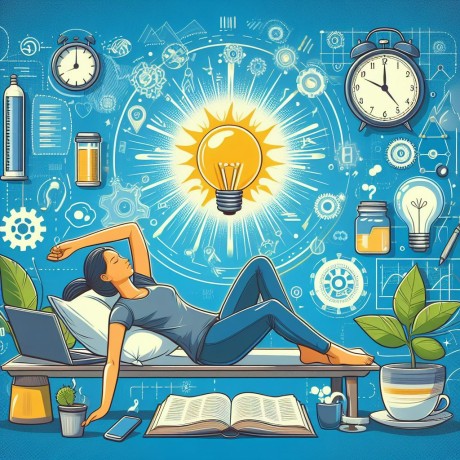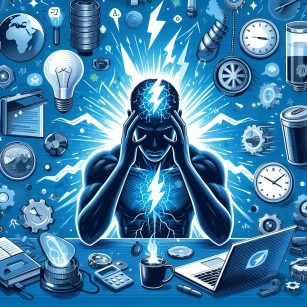Nestled at the edge of a quaint, sun-dappled village, the centuries-old oak tree stands as a silent sentinel, its gnarled branches reaching out like ancient fingers tracing stories etched into the very fabric of its bark, offering a natural retreat and inspiration on how to energize yourself quickly. The leaves, a verdant symphony of hues, rustle with the secrets whispered by the wind that dance through them. Beneath the tree’s sprawling canopy, a patchwork quilt of wildflowers unfolds, each blooms a burst of vibrant color against the backdrop of lush greenery.
As the golden hour approaches, the sunlight filters through the intricate web of branches, casting a warm, honeyed glow that bathes the surroundings in an ethereal luminosity. The air carries the heady fragrance of earth and blossoms, a sensory tapestry that weaves together the essence of the natural world. The tree, a living testament to the passage of time, wears its scars with dignity, a stoic witness to the ebb and flow of seasons. It beckons with a quiet invitation to pause, to linger, and to immerse oneself in the timeless beauty of the landscape it cradles, a sanctuary where the symphony of nature plays on, undisturbed and eternal.
1. Understanding the Consequences of Low Energy
Constantly grappling with low energy levels is more than just an inconvenience; it can significantly impact your overall well-being. Let’s dissect the various consequences of chronic fatigue:
(i) Depression
Low energy often goes hand in hand with a persistent sense of melancholy. The depleted physical state can contribute to feelings of hopelessness and despair, making it crucial to address energy levels to combat the risk of depression.
(ii) Poor Health
Chronic fatigue doesn’t merely affect your alertness; it permeates your overall health. From weakened immune responses to heightened susceptibility to illnesses, maintaining optimal energy levels is pivotal for sustaining good health.
(iii) Weight Gain
Surprisingly, low energy levels can be a silent contributor to weight gain. Fatigue often leads to sedentary behaviors and poor dietary choices, setting the stage for unwanted pounds. Recognizing this link is key to breaking the cycle.
(iv) Lack of Focus
Energy is the fuel for concentration and cognitive function. When energy wanes, so does the ability to focus. This lack of concentration can hinder productivity and impact your professional and personal life.
(v) Impaired Memory
Fatigue isn’t just a physical challenge; it takes a toll on your mental faculties as well. Memory lapses and cognitive fog become more common, affecting both short-term and long-term memory functions.
(vi) High Stress Levels
The relationship between low energy and stress is cyclical. Fatigue can be a stressor in itself, while heightened stress levels exacerbate fatigue. Breaking this cycle is paramount for overall well-being.
Now that we’ve explored the multifaceted consequences of low energy, it’s time to shift our focus to actionable strategies for combating daily fatigue and revitalizing your vitality. Let’s embark on a journey to restore your energy and reclaim a life of vigor.

2. Fix your sleep cycle to Improve Your Sleep
Quality sleep is not just a luxury; it’s a fundamental pillar for restoring energy, consolidating memories, and facilitating physical recovery. To optimize your sleep, it’s imperative to understand the different stages of the sleep cycle and cultivate healthy sleep habits. Let’s delve into the intricacies of each stage:
(i) Wake/Alert
The Wake/Alert stage marks the beginning of your sleep cycle. This is the phase where you transition from wakefulness to the initial stages of sleep. Creating a conducive environment for this transition is crucial, ensuring your sleep journey begins seamlessly.
(ii) N1 (Light Sleep)
N1, or Light Sleep, is the entry point into the sleep cycle. It typically lasts for a brief period and serves as a transition from wakefulness to deeper sleep stages. During this phase, your body starts to relax, and your brain activity begins to slow down.
(iii) N2 (Deeper Sleep)
As you progress into N2, your sleep deepens. This stage is characterized by a decrease in body temperature and a further decline in brain activity. N2 is vital for memory consolidation, and disruptions during this phase can impact cognitive functions.
(iv) N3 (Deepest Non-REM Sleep)
N3, the deepest non-REM Sleep, is the stage where your body undergoes the most significant restoration. This is the time when tissues repair, growth hormones are released, and overall physical recovery occurs. It’s the stage crucial for waking up feeling refreshed.
3. Ways to Improve Your Sleep Cycle
Now that we’ve unraveled the layers of the sleep cycle, let’s explore actionable steps to fix your sleep cycle and improve the quality of your sleep:
Establish a Consistent Sleep Schedule
Aligning your sleep patterns with a consistent schedule helps regulate your body’s internal clock, promoting a more natural transition between sleep stages.
Create a Relaxing Bedtime Routine
Engage in activities that signal to your body that it’s time to wind down. This could include reading a book, practicing relaxation techniques, or enjoying soothing music.
Optimize Your Sleep Environment
Ensure your sleep space is conducive to rest. This involves keeping the room dark, maintaining a comfortable temperature, and minimizing noise disruptions.
4. Limit Screen Time Before Bed to Improve Sleep Quality
The blue light emitted by screens can interfere with the production of the sleep-inducing hormone melatonin. Aim to disconnect from electronic devices at least an hour before bedtime.
By understanding the intricacies of the sleep cycle and implementing these practical tips, you can take significant strides toward fixing your sleep cycle and enjoying the rejuvenating benefits of quality sleep.
(i) Avoid phone screens 1 hour before bed
The blue light emitted by electronic devices can disrupt your sleep patterns. Instead, engage in relaxing activities such as reading a book or taking a warm bath.
(ii) Avoid stimulating work 2 hours before bed
Engaging in mentally demanding tasks close to bedtime can make it harder for your mind to unwind. Instead, engage in calming activities like listening to soothing music or practicing relaxation techniques
(iii) Avoid eating 3 hours before bed
Consuming heavy meals or snacks close to bedtime can cause digestive discomfort and make it difficult to fall asleep. Opt for a light, balanced meal earlier in the evening to promote better sleep. By incorporating these habits into your nighttime routine, you can create a relaxed state of mind and improve the quality of your sleep.
5. Fix Your Circadian Rhythm
Your energy levels are strongly influenced by your circadian rhythm, which regulates your sleep-wake cycle. The hormone melatonin plays a crucial role in regulating this rhythm. Light exposure affects melatonin production, which, in turn, affects your sleep and wakefulness. To optimize your circadian rhythm and improve your energy levels:
Increase Light Exposure During the Day
Expose yourself to natural sunlight or bright indoor lighting during the daytime to regulate your circadian rhythm effectively. Decrease light exposure before bed: Avoid artificial light, especially from electronic devices, for at least one hour before bedtime. The blue light emitted by these devices suppresses melatonin production, making it harder to fall asleep. If avoiding them is not feasible, consider using blue-blocking glasses to minimize the impact on your sleep. By managing your light exposure, you can align your circadian rhythm and enhance your energy levels.
6. Manage Your Caffeine Intake
Caffeine is a widely consumed stimulant that can provide a temporary energy boost. However, it’s essential to understand its effects on sleep and manage your consumption accordingly. Here are some tips to optimize your caffeine intake:
Cut caffeine 10 hours before bed
Caffeine’s stimulating effects can last for several hours, impacting both the quantity and quality of your sleep. Avoid consuming caffeinated beverages, such as coffee or energy drinks, within 10 hours of your desired bedtime. By managing your caffeine intake and allowing your body sufficient time to metabolize it, you can improve your sleep and prevent caffeine-induced fatigue.
7. Boost Your Physiology with Exercise
Exercise plays a crucial role in combating fatigue and boosting your energy levels. While many people believe they need energy to exercise, the truth is that physical activity generates energy. Incorporating regular exercise into your routine can significantly improve your overall well-being. Here are some tips to get started:
Exercise plays a crucial role in combating fatigue and boosting your energy levels. While many people believe they need energy to exercise, the truth is that physical activity generates energy. Incorporating regular exercise into your routine can significantly improve your overall well-being. Here are some tips to get started:
8. Go on Walks Regularly
Even short walks throughout the day can provide an energy boost and reduce fatigue. Take breaks from sedentary activities and move your body. By making exercise a habit, you can experience a significant increase in your energy levels and overall vitality.
Physical Exercise 3 Times Per Week At Least
Committing to at least 20 minutes of physical exercise three times a week brings a host of benefits to your well-being. This manageable routine supports cardiovascular health, aids in weight management, enhances mood, boosts energy levels, improves sleep quality, and contributes to better cognitive function. Beyond the physical advantages, this exercise commitment fosters social engagement and helps prevent chronic diseases. Incorporating this brief yet impactful routine into your week is a simple and effective way to prioritize your overall health and vitality.
Wrap Up Time
Combatting daily fatigue and restoring your energy levels is crucial for maintaining a healthy and fulfilling life. By implementing the tips provided in this article, including improving your sleep quality, optimizing your circadian rhythm, managing your caffeine intake, and incorporating regular exercise, you can effectively fight tiredness and regain vitality. Remember, small changes in your habits and routines can have a significant impact on your overall well-being. Embrace these strategies and enjoy the benefits of restored energy, improved focus, and a more vibrant life.
Frequently Asked Questions (FAQs) for How to Energize Yourself Quickly
Q: How common is fatigue among people?
A: Fatigue affects approximately 85% of individuals, making it a widespread issue in today’s society.
Q: What are the potential consequences of chronic fatigue?
A: Chronic fatigue can lead to various negative outcomes, including depression, poor health, weight gain, lack of focus, impaired memory, and high-stress levels.
Q: How many sleep cycles do we have, and how long do they last?
A: There are five sleep cycles, each lasting an average of 90 minutes. These cycles include wake/alert, N1 (light sleep), N2 (deeper sleep), N3 (deepest non-REM sleep), and REM (rapid eye movement).
Q: What can I do to improve my sleep quality?
A: To improve your sleep quality, try the 1-2-3 routine: avoid phone screens one hour before bed, avoid stimulating work two hours before bed, and avoid eating three hours before bed.
Q: How does light exposure affect my energy levels and sleep?
A: More light exposure reduces melatonin production, making it easier to stay awake. Conversely, less light exposure increases melatonin levels, promoting better sleep.
Q: Is it essential to cut out caffeine completely to improve sleep?
A: No, it’s not necessary to eliminate caffeine. Instead, cut caffeine consumption at least 10 hours before going to bed to minimize its impact on sleep.
